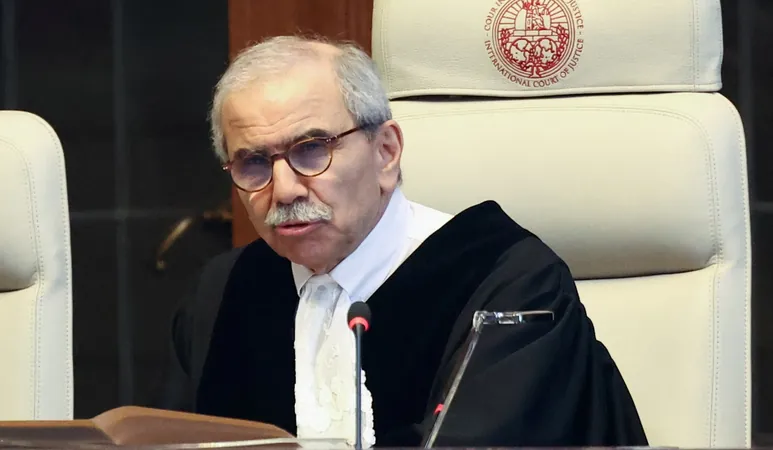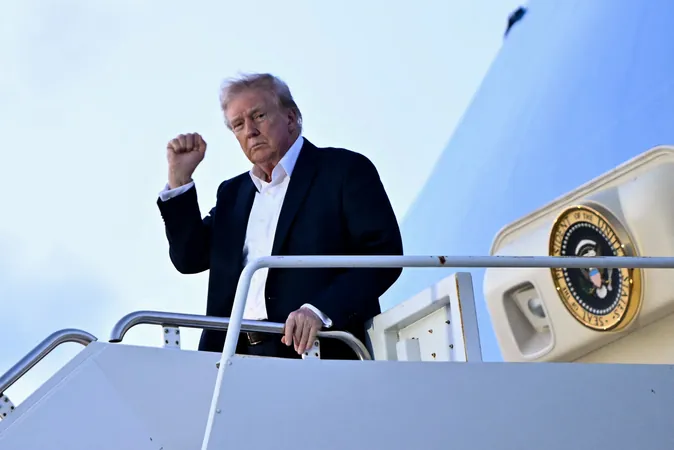
Major Political Shift in Lebanon: ICJ Judge Nawaf Salam Named Prime Minister-Designate
2025-01-13
Author: Kai
A Significant Political Transformation
Lebanon is setting the stage for a significant political transformation as newly elected President Joseph Aoun has appointed Nawaf Salam, the distinguished head of the International Court of Justice, as the country's prime minister-designate. This comes after Salam gained overwhelming support from more than half of the parliamentarians, marking a pivotal moment in Lebanon's fraught political landscape.
Hezbollah's Diminished Influence
The announcement on Monday is particularly telling of the diminished influence of Hezbollah, which had pushed for caretaker Prime Minister Najib Mikati to continue in the role. This decline in power follows Hezbollah's recent conflicts with Israel and the destabilization of its ally, Bashar al-Assad, in neighboring Syria.
A New Era in Lebanese Politics
Al Jazeera’s correspondent, Zeina Khodr, noted from Beirut that Salam's ascent is emblematic of a "new era" in Lebanese politics. Although Salam is considered a political newcomer, his formidable track record as a former ambassador to the United Nations lends him significant international credibility. His reputation as a respected judge and diplomat precedes him, which elevates expectations for his governance.
A Shift from the Political Elite
It's worth noting that Salam's appointment is cherished by a coalition of opposition and independent MPs, signaling a desire for a departure from the entrenched political elite that has been associated with mismanagement and corruption for decades. This sentiment aligns with the recent election of General Aoun as president, supported largely by the United States, illustrating a notable shift in the sectarian political dynamics that have traditionally favored Hezbollah.
Ending the Power Vacuum
The lengthy power vacuum—lasting over two years—has ended, igniting renewed hopes for economic recovery in war-affected Lebanon. The nation has been functioning under a caretaker government since November 2022, and the atmosphere seems poised for change as Aoun, a Maronite Christian, engages 128 MPs in consultations regarding the prime minister’s role.
Support for Salam
Salam's support solidified quickly, with the backing of 78 MPs reported by Monday afternoon, giving him a clear mandate compared to the mere nine votes Mikati received. Lebanon's unique power-sharing structure necessitates that the president be a Maronite Christian, the prime minister a Sunni Muslim, and the parliament speaker a Shia Muslim—making Salam’s Sunni background apt for this critical role.
A Non-Partisan Candidate
Adding a richer layer to the unfolding narrative, supporters of Salam regard him as a non-partisan candidate capable of spearheading essential reforms, a sharp contrast to Mikati, who is perceived by many to be under Hezbollah's control. MP Georges Adwan, from the Lebanese Forces party, emphasized that it is essential for Hezbollah to shift its focus towards constructive political dialogue rather than military posturing, proclaiming that "the era of weapons is over."
Hezbollah's Setbacks
Hezbollah has recently suffered significant setbacks against Israel and has been required to withdraw its fighters from the southern Lebanese border region, further complicating its position. The group’s affiliates expressed concerns over efforts aimed at fragmenting and sidelining Hezbollah, showcasing the growing discontent with the party’s governance.
Looking Ahead
As Lebanon stands at this crossroads, all eyes will be on Nawaf Salam as he prepares to lead a country yearning for stability, reform, and a beacon of hope amid ongoing economic turmoil. Will he be able to deliver the changes promised by so many? Only time will tell!

 Brasil (PT)
Brasil (PT)
 Canada (EN)
Canada (EN)
 Chile (ES)
Chile (ES)
 Česko (CS)
Česko (CS)
 대한민국 (KO)
대한민국 (KO)
 España (ES)
España (ES)
 France (FR)
France (FR)
 Hong Kong (EN)
Hong Kong (EN)
 Italia (IT)
Italia (IT)
 日本 (JA)
日本 (JA)
 Magyarország (HU)
Magyarország (HU)
 Norge (NO)
Norge (NO)
 Polska (PL)
Polska (PL)
 Schweiz (DE)
Schweiz (DE)
 Singapore (EN)
Singapore (EN)
 Sverige (SV)
Sverige (SV)
 Suomi (FI)
Suomi (FI)
 Türkiye (TR)
Türkiye (TR)
 الإمارات العربية المتحدة (AR)
الإمارات العربية المتحدة (AR)